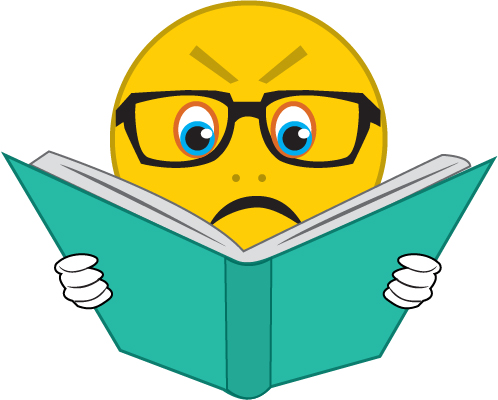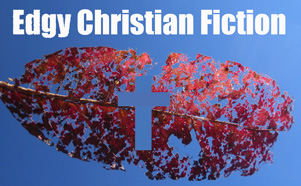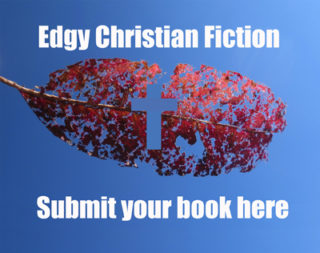
You pick up a novel thinking it’s a squeaky-clean-read and soon discover it contains colorful language and some situations that you did not anticipate. Had you known, you would not have purchased the book.
OR
You pick up a book thinking it contains dialogue that is more representative of the way people speak in today’s world. You want authenticity of voice, even though you would not use that kind of language or approve of the specific situation in the book. But you welcome it because it supports a story which, at its core, supports Christian values and biblical principles. You thought you were picking up an edgy Christian fiction book, but what you got was a squeaky clean novel that doesn’t resonate with a true voice for the intended story line. Had you known, you would not have purchased the book.

If you are a fan of Christian fiction, you might have found yourself in either one of these two situations. The problem with Christian fiction is: what may seem edgy to one person, may be perfectly acceptable to another and vice versa. Thus the dilemma: How do you know if that next Christian fiction novel you want to read, meets your personal standards as a reader?
The reviews might not reveal the degree to which colorful language, violence, and sex are part of the storyline, or to what degree the dialogue goes off the deep end.
A squeaky clean book and an edgy book might both be written with a Christian worldview, but their expression could be on opposite ends of the acceptability spectrum for you.
As a reader, there is nothing worse that feeling like you’ve been deceived. You drop the book like a hot potato and write a scathing review.
As an author, there is nothing worse than getting a scathing review from an irate reader who thought your book was one thing but got another.
As readers and authors of Christian fiction, we have been struggling with this issue for quite some time. How can the content of a Christian fiction novel be adequately described and rated so that readers won’t experience disenchantment? Ratings like G, PG 13, and R do not go far enough in describing content and voice. As we have seen, many PG13 movies contain what many would consider R material.
To that end, we’ve developed a ranking system that will reduce reader disenchantment. It won’t help if the book is written poorly, but it will let folks know, in much greater detail, what they can expect from the standpoint of, “To what degree is this book “edgy?”
The system allows the author to rank their book in one of the following categories.
Non – Edgy Christian Fiction
No offensive language / conforms to biblical principles and supports a Christian worldview as a follower of Jesus Christ.
Light – Edgy Christian Fiction
May contain uncomfortable situations / no F-bombs or implied sex / may contain light violence / conforms to biblical principles and supports a Christian worldview as a follower of Jesus Christ.
Medium – Edgy Christian Fiction
May contain stronger language, perhaps an occasional F-bomb / may contain implied sex / may contain stronger violence / conforms to biblical principles and supports a Christian worldview as a follower of Jesus Christ.
Heavy – Edgy Christian Fiction
Contains F-bombs and/or sexual situations – may be graphic / may contain heavy violence and possible gore / conforms to biblical principles and supports a Christian worldview as a follower of Jesus Christ.
It is important to note that each description contains the following parameter “conforms to biblical principles and supports a Christian worldview as a follower of Jesus Christ.” This means that merely mentioning Christianity, the pope, a Christian landmark or anything else deemed to represent Christianity, does not make it a Christian fiction book. The work must “support” a Christian worldview as a follower of Jesus Christ. This must be met or else the work is not “Christian fiction” or “Edgy Christian fiction.”
As we move to apply this ranking system to existing novels, initially, it will be up to the author to determine which rank best describes their work. If a book is in our system and the author does not rank it, it will remain without a rank until a reader applies a rank to it. Because there are so many books that need to be ranked, we hope readers and reviewers will take the time to review our books and help us with the ranking process. It is a big job, but I think the effort will be worth it for reader and authors alike. If you would like to rank a Christian fiction book, click here to rank it based on your reading experience.
If you are a blogger or reviewer and would like to join us as we build the largest most comprehensive edgy Christian fiction community, please join us. Our mission at www.edgychristianfiction.com is to help readers discover their next Christian fiction novel and to allow authors to more adequately describe what the reader can expect when reading their book.

It’s a win-win for all.



I pick up a book thinking the story will be realistic
Michelle, for me, the storyline can be unrealistic (if reading a fantasy or sci-fi work) but I expect the voice and dialogue to convince me that it could be real within the context of that story. Thanks for your comment!
Good move, Diogenes! This will definitely help readers what type of edgy Christian fiction and how much edgy they want to be exposed to! It reminds me of the rating we have in The Crossover Alliance for the books we publish there:
http://www.thecrossoveralliance.com/our-rating-system/
Great addition Diogenes, one which answers a few questions I’ve been mulling over. My current wip is definitely more edgy than the last, because it’s called for. Any reason you haven’t added suggested ages?
Thanks, Peter! I will check them out. I’m also thinking about adding one more rating, only because I have come across several books which I would also rate as “over the edge.” The language is not so much the issue as is the regurgitation of Gospel as something they’ve butchered and claim as their own beliefs. They are blasphemous rants claimed to be works of fiction. But I wonder if labeling these books as “over the edge” would only serve to bring them more attention which would not be the desired outcome. Your thoughts?
Danyele, thanks for your comment. Good question. I did not suggest ages because the only one I would be sure about is “heavy edgy Christian fiction” which would be appropriate for reader 18+ perhaps 21+. “Light” and “Medium” would be tougher because age appropriateness would vary depending on many factors, including whether the reader is a Christian reader of a secular reader and what a particular young person is allowed to read by their family. Non-edgy books did not seem like they needed an age.
Also, the genre of a particular book would help with age appropriateness, for example, children’s book, young adult or new adult. These genres help target age appropriateness. So, I kept it simple and left the ages off the ratings.
Diogenes,
Diogenes, As an author, you have the God-given responsibility to write to honour God, uphold His Word and not lead a non-believer astray or give the wrong impression of what His Word is about and who God is. As a flow-on effect, it would mean that you have to defend His Word as well. I have a similar responsibility as a reviewer of Christian fiction to not construct a review that approves false doctrine or who God is.
On my blog, I have stated this as my duty as a reviewer of Christian fiction:
“What do I expect from Christian fiction?
Generally, I hope at the end of the novel:
-it has entertained me immensely,
-it has encouraged my walk with God,
-it has not deviated from known biblical doctrine, and it will not, I believe, lead a non believer astray or promote false doctrine,
-it honours God,
-it does not encourage worship of the created (eg angels) instead of the Creator (God).
If it includes a topic that the bible is silent on, I don’t get too concerned as long as it:
-does not conflict with or undermine the bible or doctrine,
-does not dishonour God
-does not have the potential to give the reader a misleading impression of what God and Christianity is.
-generally meets the expectations mentioned previously
If it does, then this will show in my review.
However, I do respect the author’s right for poetic license. This usually encourages me to contact the author to find out what their motive was in going down this path. This helps me understand their mind set.”
We owe it to potential readers to alert them to elements that are contrary to what the Bible is about, what it says, and how God is portrayed. We have to be discerning.
For me, it would be no use having these classifications if they only addressed some of the issues and left out the “over the edge” ones. In this case, our silence or lack of a classification is sending the message that we condone the “over the edge” elements and are only concerned with those we have set a classification for. We have to be consistent.
Alerting potential readers to these classifications is our responsibility. What those readers do with this knowledge is their responsibility. If having this extra classification brings more attention to this type of fiction, then again, it comes down to what the reader does with this knowledge.
How would we feel if we received feedback to this site, that a reader read a novel that we showcased on this site but did not have an alert of the dangers of this book’s suspect content and it became a stumbling block to them and led them into false doctrine, led them away from God, contributed to sexual addiction, sexual sin, the occult, marriage breakup or other such sin/destructive behaviour and we did nothing to alert them to this, knowing what we know about the book’s content and its potential effects?
I outline in my reviews why I feel it detracts from the Bible or its doctrine or who God is.If I did not, I should not be reviewing as I would be accountable for leading someone astray by not alerting them to this in my reviews.
I guess it comes down to that old saying about buyer beware, or you get what you paid for!”
I feel you should add this över the edge” classification.
Peter, you make a compelling case for adding it, and after reading your comments, I would have to agree. I’m glad I asked. I will add the “over the edge” classification and do another post shortly.
Thanks for taking the time to write your response and thank you for your thoughtful reviews of so many edgy Christian fiction books.